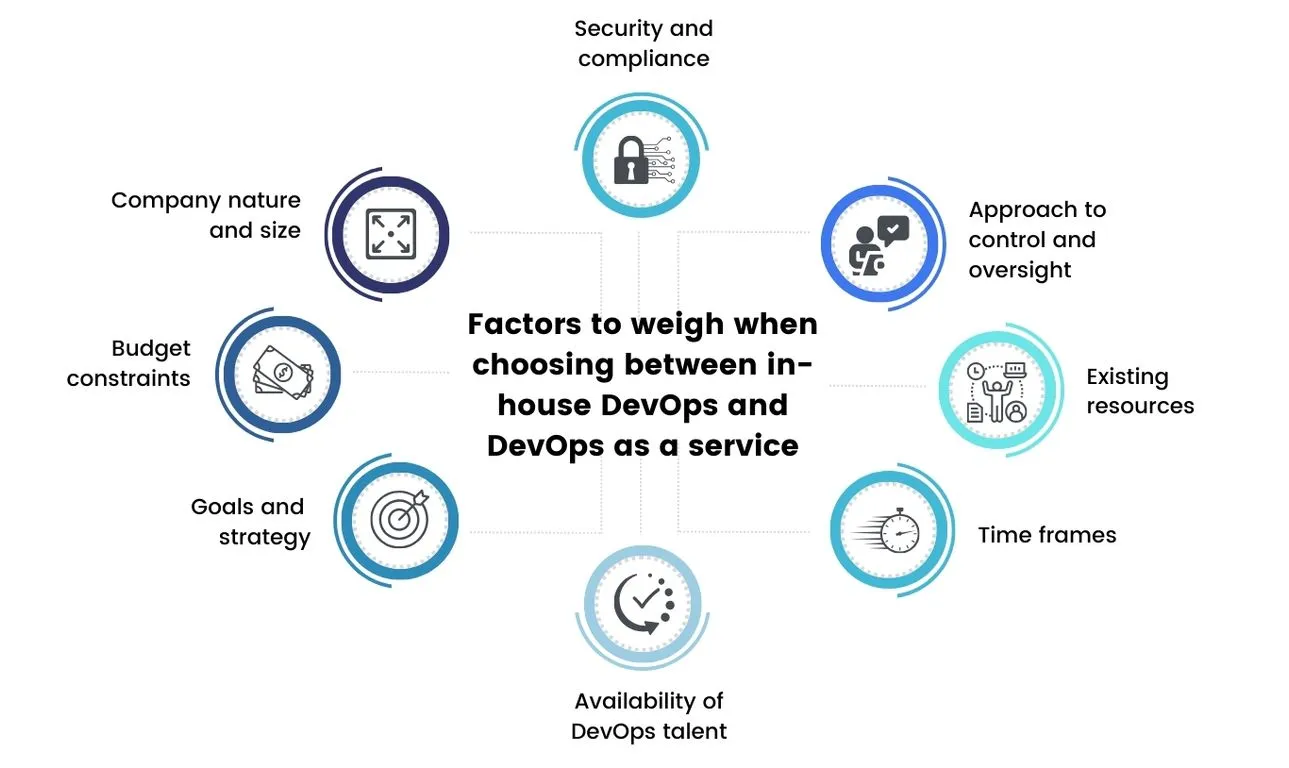These days outsourcing is very popular in the IT industry. Many companies, both larger and small, use this approach to
quickly fill in talent gaps and receive desired services. IT outsourcing companies, in turn, try to extend their set of
services in order to be able to cover all possible needs of their clients. They offer DevOps as a service too taking
into account the fact that it is considered to be widely adopted and the most efficient way to speed up and streamline
software development and delivery.
So is it a good idea to outsource DevOps? We all know the rule of thumb - handle core tasks in-house and outsource the
rest. But what about DevOps? Many companies find it rather challenging to choose between in-house DevOps and DevOps as a
service. The thing is that both approaches actually have either cons or corns. Besides, every company and every project
has its unique peculiarities and needs. All of these make the choice not so obvious.
If you are tired of sitting on the fence and want finally to make the right choice, stick around – we are going to
outline the key facets that you should take into consideration.
In-house DevOps
Let’s start with in-house DevOps, which is a usual practice of establishing and maintaining a DevOps team within a
company. Full-time employed DevOps engineers work closely with software engineers and operations experts of a company to
ensure the reliability and high speed of the software development process through extensive automation and introduction
of key DevOps practices. They are accountable for choosing the DevOps toolchain and setting up and maintaining the
infrastructure needed to introduce DevOps successfully. Moreover, DevOps engineers also play a significant role in
promoting the DevOps culture that is so important for the efficiency of this methodology.
Handling DevOps in-house has obvious advantages, but there are also certain drawbacks. One should be aware of either the
pros or cons.
Advantages:
With in-house DevOps, a company has total control over a DevOps team, including its managing, training, and tracking
performance and work progress. No need to say that it is always easier to manage and control staff when all of them work
under one roof.
The role of direct communication cannot be underestimated. Of course, modern technologies enable easy and convenient
communication with people from any corner of the world and daily online meetings are a norm for the vast majority of
teams, but we all know that far too often the best ideas come during water cooler chats. Direct, face-to-face
communication with DevOps engineers facilitates quick acceptance of the DevOps culture.
As a rule, an in-house DevOps team manages to better align with the company's corporate culture, objectives, and values.
Due to this, for the team, it is easier to come up with DevOps practices tailored to the particular needs of the
company.
In-house DevOps also gives a company full control over compliance and security as it can directly implement required
measures. Moreover, this way it is also easier to control whether DevOps engineers strictly adhere to the company’s
security and compliance policies.
Over time, in-house DevOps engineers gain a deep understanding of industry challenges and the company’s systems and
processes, which usually results in better efficiency and innovation.
Challenges:
Finding skilled DevOps professionals can be a real beast. Still, it is usually even more challenging to attract and
retain brilliant talent. Nowadays, the demand for experienced DevOps engineers is high, which results in a competitive
job market. To lure and retain top talent, companies have to offer high wages, comprehensive social packages,
comfortable work conditions, and great opportunities for professional growth.
With regard to the lack of highly professional DevOps engineers, companies can spend a few months on the recruitment
process including talent searching, profile scanning, pre-screening, and interviewing. Besides, once you find a
specialist with the required skill set who is ready to accept your offer, you should also wait for a month or two more
before they get onboarded due to the notice period. Now imagine that in a while you understand that the hire has not met
expectations, and you have to start all over again.
Once DevOps engineers are onboarded, you should provide them with ongoing training to keep them up with rapidly evolving
DevOps tools and technologies. Continuous skill development is a must to maintain a proficient in-house DevOps team.
DevOps implementation, on its own, requires a significant upfront investment in the required tools and infrastructure.
Besides, if you have an intention to set up an in-house DevOps team, be ready to pay each DevOps engineer a goodish sum
of money. Thus, according to Glassdoor, in the US, in 2023, the average salary of DevOps specialists with 4-6 years of
experience is about USD 130,191, and that’s without taxes and perks.
DevOps outsourcing
Not everyone shares Napoleon Bonaparte’s idea of 'If you want a thing done well, do it yourself.' The ability to delegate tasks is important for a good manager and a wise business owner. Actually, the concept of task delegation lies behind outsourcing. With regard to this, DevOps outsourcing is a model suggesting the collaboration of an organization with an external vendor that provides required DevOps services to it.
An outsourcing partner can choose the most appropriate DevOps tools, manage the infrastructure, and set up a continuous integration and delivery pipeline, continuous monitoring, and logging. All of these are performed in close collaboration with in-house software engineers and operations experts. But there is more to it. A usual suite of DevOps services that IT outsourcing companies offer also includes cloud integration, cloud migration. infrastructure audits, automation, and many more.
DevOps outsourcing offers many benefits but also introduces certain risks. Let’s have a look at them.
Advantages:
Collaboration with a provider of DevOps services grants you access to specialized experts – seasoned DevOps consultants and DevOps engineers with profound knowledge and experience in various DevOps tools, practices, and technologies. This allows you to take advantage of better solutions and faster problem resolution.
We mentioned above that setting up an in-house DevOps team is associated with a time-consuming recruiting process. On the flip side, an outsourcing company can provide you with a full-fledged DevOps team within the shortest possible time and without any hassles.
Finally, we have reached the most prominent advantage of DevOps outsourcing - cost saving. It’s not a secret that far too often cost is a determinative factor. Outsourcing is a great opportunity to bring in great DevOps experts with lower salary rates. Moreover, you may not also care about perks, leave payments, taxes, and other additional expenses associated with traditional employment.
Your DevOps needs might change over time. DevOps outsourcing offers great opportunities for flexibility letting companies adjust resources as projects evolve. It is possible to easily scale up or down DevOps support based on current project requirements without a need to hire additional specialists or lay off employees. Besides, if one outsourcing company has let you down, it is not a problem to quickly replace it with another one as you are not bound by any long-term commitments.
As you see DevOps outsourcing really deserves your attention due to its numerous benefits. Still, there is a fly in the ointment. DevOps outsourcing is also associated with some challenges that one should always consider. Let’s talk about it in detail.
Challenges:
Effective communication and collaboration with an external DevOps team often located in other corners of the world and other time zones can be indeed challenging. Miscommunications and cultural differences may affect project progress and outcomes. All in all, management of outsourced teams always requires more effort.
When businesses outsource DevOps, they usually have less direct control over the day-to-day operations and decision-making. This can be a considerable concern for those who want to have hands-on control over their DevOps practices.
Over-reliance on an external service provider can create vulnerabilities in case it faces disruptions or goes out of business. It's highly recommended to have contingency plans and exit strategies in place. Besides, you may also find yourself limited by the services offered by your outsourcing partner, which may result in reduced flexibility.
Outsourcing is always associated with security risks. Sharing your sensitive data with an external vendor and granting it access to your infrastructure can pose security and privacy risks. Robust security measures and agreements should be in place to mitigate these concerns.
An outsourced DevOps team may lack profound knowledge of the domain and therefore company’s unique requirements. This can result in inefficiency and difficulties in tailoring DevOps practices to the company's needs.
Factors to weigh when choosing between in-house DevOps and DevOps as a service
The debate between fans of outsourcing and insourcing has been held for many years. While some strongly believe that outsourcing is the best way to go, others still choose insourcing. What about you? Do you know what’s best for your business – to handle DevOps in-house or outsource it? If you are in two minds whether to opt for one or another approach, we offer you to deliberate over the following aspects that will help you to make the right decision.
Company size often affects the choice. For instance, small companies usually have a shoestring budget. Hardly can they afford to build and maintain their own DevOps teams. If there is an urgent need to streamline software development and delivery through DevOps practices, an outsourced DevOps team is the best solution for them. Outsourcing companies can provide small companies with seasoned and skilled DevOps specialists who can help them handle their projects in a proper way.
Not only small companies can be on a tight budget. We recommend everyone carefully evaluate a budget and costs to be sure that they can allocate the required financial resources to building and maintaining their own DevOps team. If your budget is restricted, consider outsourcing as a more affordable option.
Take time to analyze the long-term goals and strategic objectives of your company. Then, determine if your DevOps needs are primarily short-term or long-term. When it comes to short-term projects with specific goals, outsourcing might be preferable. In case you have a long-term and large-scale project with ongoing support, it would be better to create an in-house DevOps team.
Study a job market. You may face difficulties with finding DevOps specialists with the needed skills and proficiency level in your city or country. So if you find yourself in a situation where you have limited access to professional staff, it would be reasonable to give DevOps outsourcing a try.
Quite often time is a crucial factor for businesses. Decide how quickly you must introduce a DevOps process. Outsourcing offers a quicker start, while assembling an in-house team takes a considerable amount of time.
It also makes sense to evaluate the skills and resources that you currently have within your company. If your team has a strong technical background, it may be easier to establish an in-house DevOps capability. Of course, it requires investment in training, but if you have enough time, it can be a way to go.
Define the level of control and oversight you would like to have over your DevOps processes. An in-house team offers direct control, while DevOps outsourcing may require relinquishing some control to an external service provider.
Decide whether you are ready to share your sensitive data with an external vendor. When it comes to top-secret software development, the irrelevance of outsourcing is obvious. Still, if your risk tolerance lets you engage outsourced DevOps engineers, why not take advantage of it? Besides, due to extensive expertise, outsourced teams often have all the needed resources and knowledge to ensure complete compliance with industry regulations.
Conclusion
DevOps is an efficient approach to software development that helps companies deliver excellent software solutions at high speed. If you have made up your mind to implement it, you have two options - to build an in-house DevOps team or to go for outsourcing. Which approach is better? There is no one-size-fits-all answer to this question. Both, in-house DevOps and outsourced DevOps have either strengths or weaknesses. To make a well-informed decision, every business should analyze its own priorities, needs, and capabilities.





